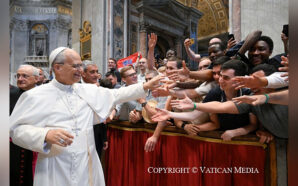With the death of Queen Elizabeth II and the installment of King Charles in our recent memories, we might have a heightened awareness of royalty. Yet few of us would have had any significant interaction with them. So how do we relate to Christ as Royalty? In an Australian society that is not big on hierarchy, and has long considered becoming a Republic, why see God as “King”?
The term King can have many connotations: he is the Ruler of a Peoples; he is of a special bloodline; the holder of all power; evoking reverence and submission. These make sense in relation to God as well: God is ruler of creation and of each of our lives, with Divine bloodline, the holder of sovereign power, the ability to reign over the world, and within us. Evoking reverence, submission, honour, admiration, adoration….
Seeing God as King helps create a more complete sense of who God is. God of course is undefinable – we try to capture God in many but limited ways: God as “Father” loves us unconditionally as a parent would love and protect a child; God as “friend” stands by us through our trials as would the dearest of dearest friends; God as “Creator” dotes on us as one would dote on the most precious of creations; God as “Saviour” has swooped down to save us, as the most magnificent of heroes would…
But God also is a Being more superior, majestic, royal, powerful, worship-worthy and awe-inspiring than our limited minds can ever comprehend. Having a special feast day to remind us of this, might be just what we need to open ourselves to something so unimaginable and magnificent. When I first walked into St Peter’s Cathedral in Rome, or stood next to the soaring trees in the Dandenong Ranges, or was eclipsed by a towering mountain in the Grampians, I became acutely aware of the difference in size, the grandeur of what I was standing beside. I felt awed by what was around me.
Awe is defined as respect and reverence mixed with fear and wonder, often inspired by something majestic or powerful. When we reflect on the power and majesty of God, awe is all we can truly experience. When we see God as “King”, our smallness and God’s greatness fall into right perspective. A deep respect grows in us. We may be better able to accept that not everything in life needs to be according to our understanding. That a more superior being, a King, just might have the authority to run the universe in ways incomprehensible to us. So maybe, our relationship with God can be that mixture of awe and familiarity, respect and playfulness – as a little child might leap onto the lap of a warm and kind father, or share a worry with an understanding mother, yet know in no uncertain terms that there are family rules that cannot be broken.
What then of killing our Divine King? We know of Pilot’s struggle – having an uncomfortable sense that Jesus is in fact God, but too concerned with retaining worldly power to act on this. As a compromise, he adds the inscription on the cross of Jesus, “This is the King of the Jews”. A bet each way. We know of the thieves hung beside Jesus, one recognising Jesus as God, one scoffing at Jesus. You could say, Pilot and the two thieves, each represent aspects of ourselves. Like Pilot, we too are likely to keep one foot on each side of a moral dilemma, pacifying any worldly critics, while at the same time trying to pacify a troubled conscience. Or we might partake in many unchristian practices but attend Sunday Mass to assuage a sense of guilt. What are the elements in our lives that push us to deny God in innumerable ways? The esteem of peers, the desire for wealth or honour, a need for security or comfort or pleasure or to have things as we want them, even a need to right wrongs but at any cost…
Similarly, like one of the thieves, we might challenge or even doubt God’s power to intervene because of unanswered prayers, who-are-You-God if you cannot get me down from this cross I am dealing with?
And like the so-called “good” thief, there will be moments in our lives, no matter how sullied, or self-righteous we might be, when we are struck unquestionably by a sense of Truth deep inside of us.
What does it take for us to be this ‘good thief’, to hear this Truth in our hearts more often? I believe we need to have an understanding of God at the two extremes, not only as majestic King but as intimate friend as well. A friend in high places if you like.
Ever asked a friend for a favour? By doing so, we are firstly admitting that we trust this friend by being vulnerable. That the friendship is deep enough to entrust our problems, and solid enough for us to seek help within the friendship. We are also recognising that this friend has the capacity to help us.
How much more so with God! I believe the God of our lives can be small enough to sit beside us and share our pain, but immeasurably mighty in having the capacity to remove any and all obstacles from our lives, if need be. This wide sense of God keeps us open to the Truth, being vulnerable with God, but also feeling held, and utterly safe with a sovereign God that can control any aspect of our lives, even work a miracle if necessary.
While many intellectuals shirk at the idea of miracles, C.S. Lewis, the Christian writer, wrote an entire book defending miracles – in which he argues that those opposed to miracles think God is restricted by natural law. Lewis argues that while God will not work against what was created, nature is not the whole of reality. God encompasses nature, and so can and does interpose into natural law.
Yet, as humans we like to work with clear boundaries, clear-cut definitions. Whether by insisting that the laws of physics dictate the limits of what God can do, and in effect containing God to our understanding; or by categorising things or stereotyping people so it is easier for us to understand them. We might insist that relationship with God can exist only under defined conditions, condemn behaviour contrary to these, and decry the slightest deviation from theological understandings of the past. By having neatly drawn, unchanging boundaries, and keeping things black and white, we pander to our need for security and our aversion to change. If we stay within clearly defined boundaries, we believe we gain automatic affirmation of our behaviour, without needing to think too deeply or take responsibility for our behaviour.
With this attitude we risk falling into a tick-the-box approach, that of strictly following laws, instead of seeing the broader purpose behind it. An approach repeatedly criticised by Jesus. We also limit people when we pigeonhole them, stopping them from reaching their full potential.
Instead, we might heed the advice of a priest friend of mine, to sit with the uncomfortable tension of contrary notions of God, so that the grey areas of faith can draw us to ponder more deeply an incomprehensible but loving God. Doing this, we might see beyond the obvious – in people, in situations, and in how we see God. We can grow from a basic intellectual understanding of our faith to a deeper understanding germinated within a soft heart.
For when we allow a Kingly God to be in control, of life and of our hearts, when we trust that this King is also our dearest friend, wanting only the best for us, things start falling into place. We do not need to operate from fear, or a need for control, or a need to see the world and all its complex challenges within dichotomous options. We can stay loose within ourselves, soft in the heart, trusting in God, and marvel as miracles, small and large, happen all around us.
Let us remember, a God limited to our understanding is not God.
Dr Nimmi Candappa was a member of the recent Australian Plenary Council. As an academic and engineer with a passionate faith, she takes great interest in exploring reasons for the widening gap between the heart of society and the heart of God.
This reflection was originally written as part of the Australian Women Preach initiative.








